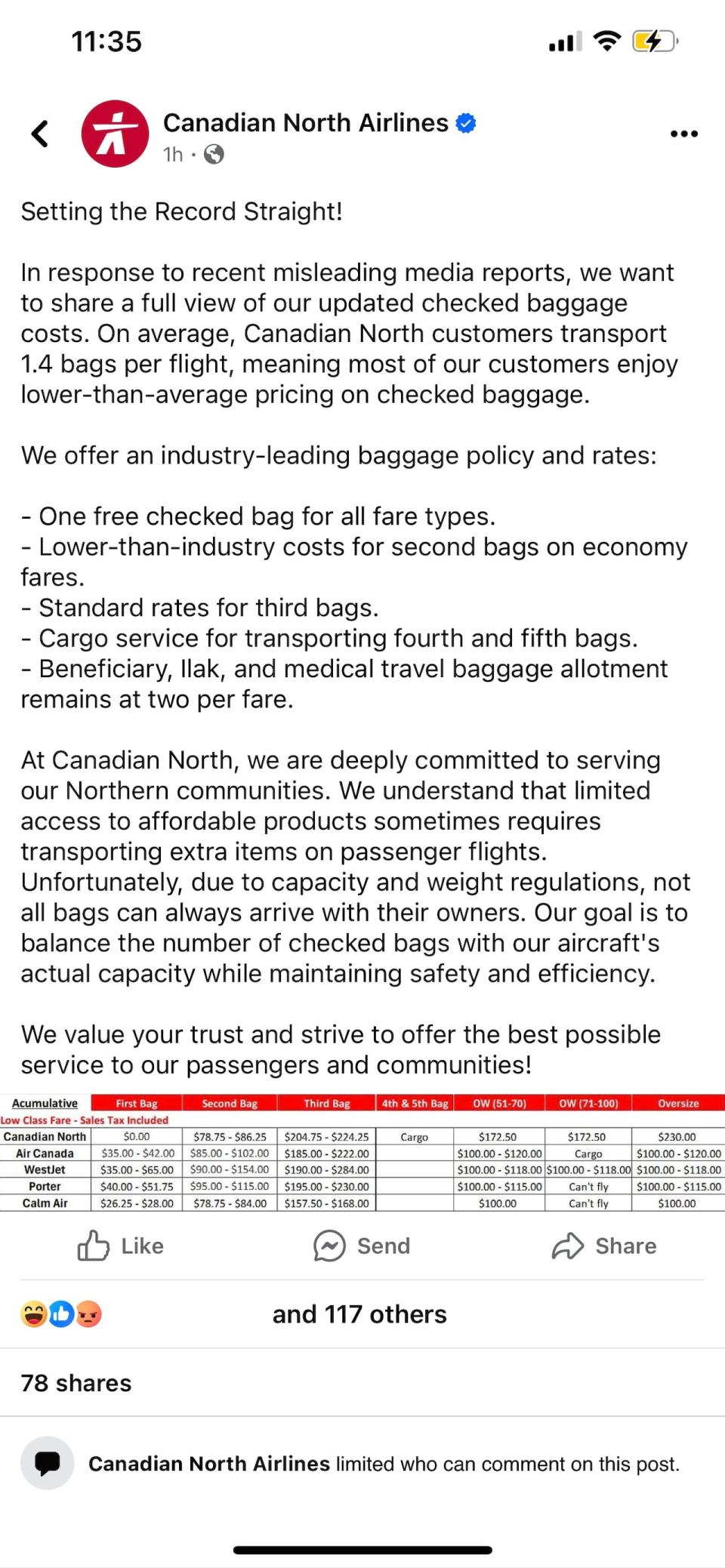'We have to be realistic,' says Canadian North about new baggage fees
Canadian North says its new baggage fees are about the airline being "realistic about our capabilities" to carry an ever-growing volume of cargo and passengers on its commercial flights.
Last month, the airline rolled out sweeping changes to its baggage policy, and also increased costs. While passengers can still check their first bag for free, the cost of a second bag on the lowest ticket fare jumped by 50 per cent, and the cost of an overweight bag (anything over 51 pounds) tripled on all fare types. Excess bags also now fly standby.
Canadian North initially refused to answer questions about the changes in an interview, but later agreed after CBC News reported on the changes and conducted an analysis of how its fees compare to some of Canada's other airlines.
"Our aircraft can only operate with a certain amount of weight and volume. Recently the requested volume of baggage often exceeds our limits, and leads to bumped baggage and fewer passenger seats," said Trevor Wilde, the airline's interim vice president of sales, marketing and distribution.
He added when those limits are exceeded, it affects the airline's ability to transport essential cargo, like food and pharmaceuticals, especially when flying in bad weather or when landing on restricted runways.
In his original written statement to CBC, Wilde said the baggage changes came following "customer requests." Asked to elaborate, he said passengers want their bags to travel with them.
"We have to be realistic about our capabilities and making these changes provides opportunities for enhanced seats and to ensure that passengers do travel with their bags and their bags get there on time."
The day after CBC's report, Canadian North posted a statement on its official Facebook page saying it was "setting the record straight" amid what it called "misleading media reports." The post was then deleted after about three hours.
The company's post included statistics on the volume of checked bags, where the airline claimed customers transported an average of 1.4 bags per flight.

Asked whether discouraging passengers from checking extra bags and highlighting the 1.4 average checked bags were conflicting statements, Wilde said "not necessarily" because the average figure factors all flights on the airline's network.
"At the end of the day, even though that is the average, some people bring five [checked bags] or some people even request to bring more, while others will bring nothing," Wilde said.
"So while that's the average, overall it's dependent on per flight, and we're really just trying to right-size that overall volume."
Wilde also said the number of oversize bags is on the rise, increasing by 3.5 per cent year-over-year since 2020.
'A negative impact'
One user group in Nunavut worried about the new changes is the territory's athletes.
"This is going to have a negative impact on the budgets of the territorial sport organizations, and on travel in general," said Romeyn Stevenson, the chair of Sport Nunavut which represents most of the territory's sports organizations.
Aside from the added costs, Stevenson said the provision where excess bags travel standby could jeopardize an athlete's window to compete. He likened it to weather-related flight cancellations, which — because of the infrequency of flights leaving certain communities — could quickly see an entire team eliminated from one of the few tournaments for any given sport.
Similarly, if a bag is left behind because of the new policy, Stevenson says it could ruin an athlete's opportunity to compete.

"[Weather] can't be controlled. But [the excess baggage policy] could also cause that same kind of disappointment and an effect on athletes. And this is within people's control. So it's a bigger deal to me," Stevenson said.
"If your equipment doesn't show up because it was bag number two, you don't play. There's not a dearth of equipment there to participate once you get there. We could have situations where kids in sports are on the ground, but they don't have the stuff to actually participate in the tournament.
"That kind of disappointment is huge. But it also has a long term effect on their sport career because we have so few tournaments."
Stevenson said Sport Nunavut and Canadian North have been in negotiations over athlete travel and fares for about eight months, without striking a deal.
In response, Wilde said the airline is committed to working closely with sport and youth organizations to make sure they can travel with necessary equipment without extra charges or delays.


